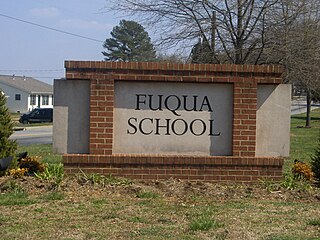Related Research Articles
Lum v. Rice, 275 U.S. 78 (1927), is a United States Supreme Court case in which the Court held that the exclusion on account of race of a child of Chinese ancestry from a public school did not violate the Fourteenth Amendment to the United States Constitution. The decision effectively approved the exclusion of any minority children from schools reserved for whites.

The NAACP Legal Defense and Educational Fund, Inc. is a leading United States civil rights organization and law firm based in New York City.
Massive resistance was a strategy declared by U.S. Senator Harry F. Byrd Sr. of Virginia and his brother-in-law James M. Thomson, who represented Alexandria in the Virginia General Assembly, to get the state's white politicians to pass laws and policies to prevent public school desegregation, particularly after the Brown v. Board of Education Supreme Court decision in 1954. Many schools, and even an entire school system, were shut down in 1958 and 1959 in attempts to block integration, before both the Virginia Supreme Court and a special three-judge panel of Federal District judges from the Eastern District of Virginia, sitting at Norfolk, declared those policies unconstitutional.
Allen v. Wright, 468 U.S. 737 (1984), was a United States Supreme Court case that determined that citizens do not have standing to sue a federal government agency based on the influence that the agency's determinations might have on third parties.

Jackson Academy is a private school in Jackson, Mississippi founded by Loyal M. Bearrs in 1959. Bearss claimed he established the school to teach using an accelerated phonics program he developed, but the school remained completely racially segregated until 1986, including foregoing tax exemption in 1970 to avoid accepting Black students.

Segregation academies are private schools in the Southern United States that were founded in the mid-20th century by white parents to avoid having their children attend desegregated public schools. They were founded between 1954, when the U.S. Supreme Court ruled that segregated public schools were unconstitutional, and 1976, when the court ruled similarly about private schools.

Fuqua School is a private primary and secondary school located in Farmville, Virginia. It was founded as Prince Edward Academy in 1959 as a segregation academy and renamed after businessman J. B. Fuqua made a large contribution to the school in 1993.

Briarcrest Christian School is a private, coeducational, Christian school in Eads, an unincorporated area of Shelby County, Tennessee. The school was founded as a segregation academy during the racial integration of public schools in Memphis, Tennessee. Today, it serves students in kindergarten through 12th grade. The school also offers "early school" for ages 2-4.

Racial segregation in the United States is the segregation of facilities and services such as housing, medical care, education, employment, and transportation in the United States on racial grounds. The term is mainly used in reference to the legally or socially enforced separation of African Americans from whites, but it is also used in reference to the separation of other ethnic minorities from majority and mainstream communities. While mainly referring to the physical separation and provision of separate facilities, it can also refer to other manifestations such as prohibitions against interracial marriage, and the separation of roles within an institution. Notably, in the United States Armed Forces up until 1948, black units were typically separated from white units but were still led by white officers.

Wake Christian Academy (WCA) is a private, Christian, co-educational school in Raleigh, North Carolina, United States. It was established in 1966 as a segregation academy in response to the racial integration of public schools.
Lamar School, is an independent coeducational school located in Meridian, Mississippi, United States founded in 1964 as a segregation academy. It consists of elementary, middle, and high school, and serves grades Pre-K through 12th. The school is located on a 40 acres (16 ha) site on Lindley Road.
Tunica Academy is a K-12 non-denominational Christian private school located in unincorporated Tunica County, Mississippi, near Tunica. The school was founded in 1964 and has been described as a segregation academy. Tunica Academy is an accredited member of the Mississippi Private School Association.

The Mississippi Delta region has had the most segregated schools -- and for the longest time—of any part of the United States. As recently as the 2016–2017 school year, East Side High School in Cleveland, Mississippi, was practically all black: 359 of 360 students were African-American.
This is a timeline of the civil rights movement in the United States, a nonviolent mid-20th century freedom movement to gain legal equality and the enforcement of constitutional rights for people of color. The goals of the movement included securing equal protection under the law, ending legally institutionalized racial discrimination, and gaining equal access to public facilities, education reform, fair housing, and the ability to vote.
Starkville Academy (SA) is a private kindergarten through 12th grade school in Starkville, Mississippi, operated by the Oktibbeha Educational Foundation. It was founded in 1969 on property adjacent to Starkville High School as a segregation academy.

Calhoun Academy (CA) is a private school in Pittsboro, Mississippi, founded in 1968 as a segregation academy.
The Mississippi Red Clay region was a center of education segregation. Before the Brown v. Board of Education decision in 1954, Mississippi sponsored freedom of choice policies that effectively segregated schools. After Brown, the effort was private with some help from government. Government support has dwindled in every decade since. In the state capital, Jackson, some public schools were converted to white-only Council schools. Today, some all-white and mostly-white private schools remain throughout the region as a legacy of that period.
East Holmes Academy (EHA) was a segregation academy in West, Mississippi. The school was founded in 1965 and closed in 2006. In 1989, EHA received national attention after two incidents involving alleged racial discrimination.
Canton Academy, officially known as the Canton Academic Foundation, is a segregation academy in Canton, Mississippi, the county seat of Madison County. It serves 285 students in grades K-12.
Saints Academy was a private 1-12 school in Lexington, Mississippi, the county seat of Holmes County. Founded by the Church of God in Christ in 1918 as the Saints Industrial and Literary School, a school for black children in a segregated environment, it gradually expanded. Under principal Arenia Mallory from 1926-1977, the school added grades until it provided classes through high school. It had a national reputation for its strong academics and attracted students from outside the region, including from families who had migrated north.
References
- ↑ Robinson, Gerald (March 8, 2016). "The South's School Choice Scars". U.S. News & World Report. Retrieved 15 January 2018.
- 1 2 "Coffey v. State Educational Finance Commission, 296 F. Supp. 1389". S.D. Miss. January 29, 1969. Retrieved 15 January 2018.
- ↑ Hall, Isabelle (July 18, 1970). "IRS sets the rules". Pittsburgh Courier. Retrieved 8 January 2018.